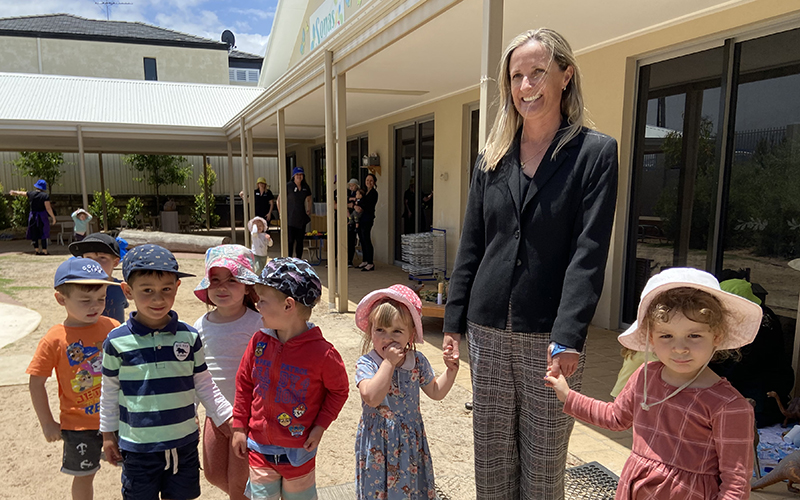 Childcare centres will be invited to help boost children’s physical activity levels by signing on to a new program which commits them to creating more opportunities for physical activity, including energetic play.
Childcare centres will be invited to help boost children’s physical activity levels by signing on to a new program which commits them to creating more opportunities for physical activity, including energetic play.
The Play Active Program – developed by The Kids Research Institute Australia researchers in collaboration with ten partners across government, not for profit, the private sector and academic institutions – gives childcare centres clear guidance on how to achieve physical activity guidelines for the early years.
The Australian 24-hour Movement Guidelines for the Early Years state young children should have three or more hours of physical activity per day, including energetic play, but lead researcher Associate Professor Hayley Christian said only a third of children aged 2-5 years were achieving the recommended daily dose of physical activity.
“Physical activity is essential for children’s health and development and is a really important behaviour to establish early on in life, but few young children are getting the daily physical activity they need,” Associate Professor Christian said.
“We know that kids need at least three hours of physical activity per day, preferably more, to be healthy and developing well."
“This should include lots of short, sharp bursts of energetic play throughout the day – activity that makes them huff and puff – as well as light intensity active play and lots of different types of explorative, imaginative active play.”
Associate Professor Christian said given that young children spent a lot of their time outside of the home at childcare, there was a real opportunity in those settings to help boost children’s daily physical activity levels, and in turn improve their health and development.
“The Australian National Quality Standard – which sets a national benchmark for the quality of education and care services – requires childcare centres and educators to promote physical activity and healthy eating, but in reality there’s little guidance as to how they should go about this,” she said.
“Many early childhood educators aren’t sure what the recommendations around physical activity are, let alone how to ensure they are met. So we saw a real need there for evidence-based guidance, training and support and that’s what we’ve sought to address in developing the Play Active program.”
The program includes a physical activity policy which sets out how much physical activity, sedentary time and screen time children should have when at childcare, and provides managers and educators with training, professional development, and resources to help achieve this.
“This is an evidence-informed policy that’s been guided by data we’ve collected throughout Australia.”
“Importantly, it comes with a practical resources guide which includes lots of tips and advice that will help services to implement the policy, to allow children to be active as often as possible throughout each day.”
Nature Play chief executive officer and Play Active partner Griffin Longley said the program offered childcare centres the perfect opportunity to bring more active play into the daily life of the kids in their care.
“There are a range of ways kids can get the active play they need,” Mr Longley said.
“It can be unstructured play, just outside mucking around with each other, it can be structured programs, or just part of the regular course of the day.
“The benefits of energetic play and play outdoors are enormous – it’s the bedrock of a happy and healthy childhood – and it’s really the way that we engage the intrinsic motivation of kids to be active, to imagine, to create, and to be social.
“Through that, they’re healthier, their mental health is improved, their cognitive development increases. Across the board, energetic play is good for kids and early childhood settings are perfect places to facilitate that. This policy gives educators all the tools they need to help the kids in their care thrive and flourish.”
Associate Professor Christian said the policy – launched at The Kids today by Minister for Community Services, the Hon. Simone McGurk – would be rolled out and evaluated in Perth initially.
“Once we’ve had feedback from services, families and other stakeholders it will be available to all of WA and to other states.”
Similar to Cancer Council WA’s iconic SunSmart program – already available to centres – those services that commit to implementing the physical activity policy will be able to apply for endorsement as a Play Active centre.
“Once services express their interest they’ll be provided with the physical activity policy template which they can adapt to their service’s and families’ needs,” Associate Professor Christian said. “They then submit their policy for review and approval. Once approved, they receive support, resources and training to implement their policy in their centre and can sign up to become a Play Active centre.”
ECEC services that would like to become involved can register their interest at the Cancer Council WA website.
Play Active has been developed by the PLAYCE Policy Project, a joint initiative between The Kids Research Institute Australia, The University of Western Australia, Queensland University of Technology, University of Southern Denmark, Goodstart Early Learning, Minderoo Foundation-CoLab – Collaborate for Kids, Nature Play Australia, Cancer Council WA, Australian Childcare Alliance, WA Department of Local Government, Sport and Cultural Industries and WA Department of Health. The Australian National Health and Medical Research Council provided funding.
